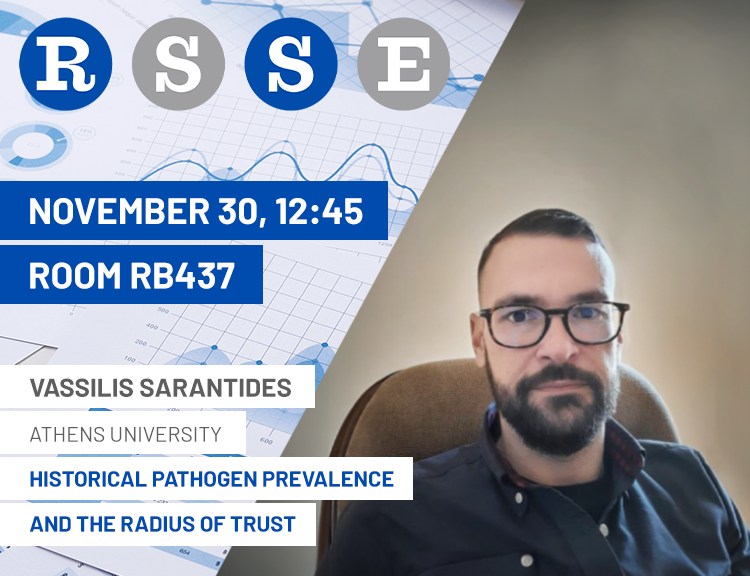Vassilis Sarantides (Athens University of Economics and Business) 30.11.2023
V rámci Research Seminar Series in Economics máme tu čest, že nám v čtvrtek 30.11.2023 od 12:45 do 14:15 v místnosti RB437 bude přednášet dr. Vassilis Sarantides (Athens University of Economics and Business) o svém výzkumném projektu s názvem „Historical pathogen prevalence and the radius of trust“.
Registration is not required and anyone who would like to attend is warmly invited.
ABSTRACT: Why do people exhibit different levels of trust between strangers and those who are socially close to them? This study tests the hypothesis that societies with a historical prevalence of infectious diseases develop strategies to minimize contact with potentially unhealthy or contaminated out-groups, while emphasizing strong local networks of in-groups to manage infections effectively, ultimately leading to a lower radius of trust, defined as the difference between out-group and in-group trust. Our empirical analysis verifies this hypothesis using (i) cross-country; (ii) cross-country individual-level; (iii) ethnic group-level; and (iv) individual-level data for a sample of second-generation migrants. In particular, our findings support a robust negative association between historical pathogen prevalence and the contemporary radius of trust, specifically when we differentiate attitudes between socially distant groups (e.g., people met for the first time) and family members. Furthermore, this pattern remains consistent when we proxy trust attitudes using historical data on disapproval of violence at the ethnic group level from the Standard Cross-Cultural Sample. We find that an increase in social distance when differentiating attitudes between local community members and distant groups from other societies leads to a decline of disapproval of violence with increasing pathogen prevalence. Overall, historical pathogen prevalence sheds light on a fundamental cultural trait that persists over time.
BIO: Vassilis earned his BSc in International and European Economic Studies from Athens University of Economics and Business (AUEB) in 2005, followed by an MSc in International Economics and Finance in 2007 and a PhD in Economics in 2011, all from AUEB. In 2012, he joined the University of Sheffield’s Department of Economics as an Assistant Professor and later, in 2022, he returned to AUEB in the same capacity. His primary research interests encompass Economic History, Political Economy, and Public Finance. His work has been published in scientific journals such as European Economic Review, Exploration in Economic History and Public Choice.
